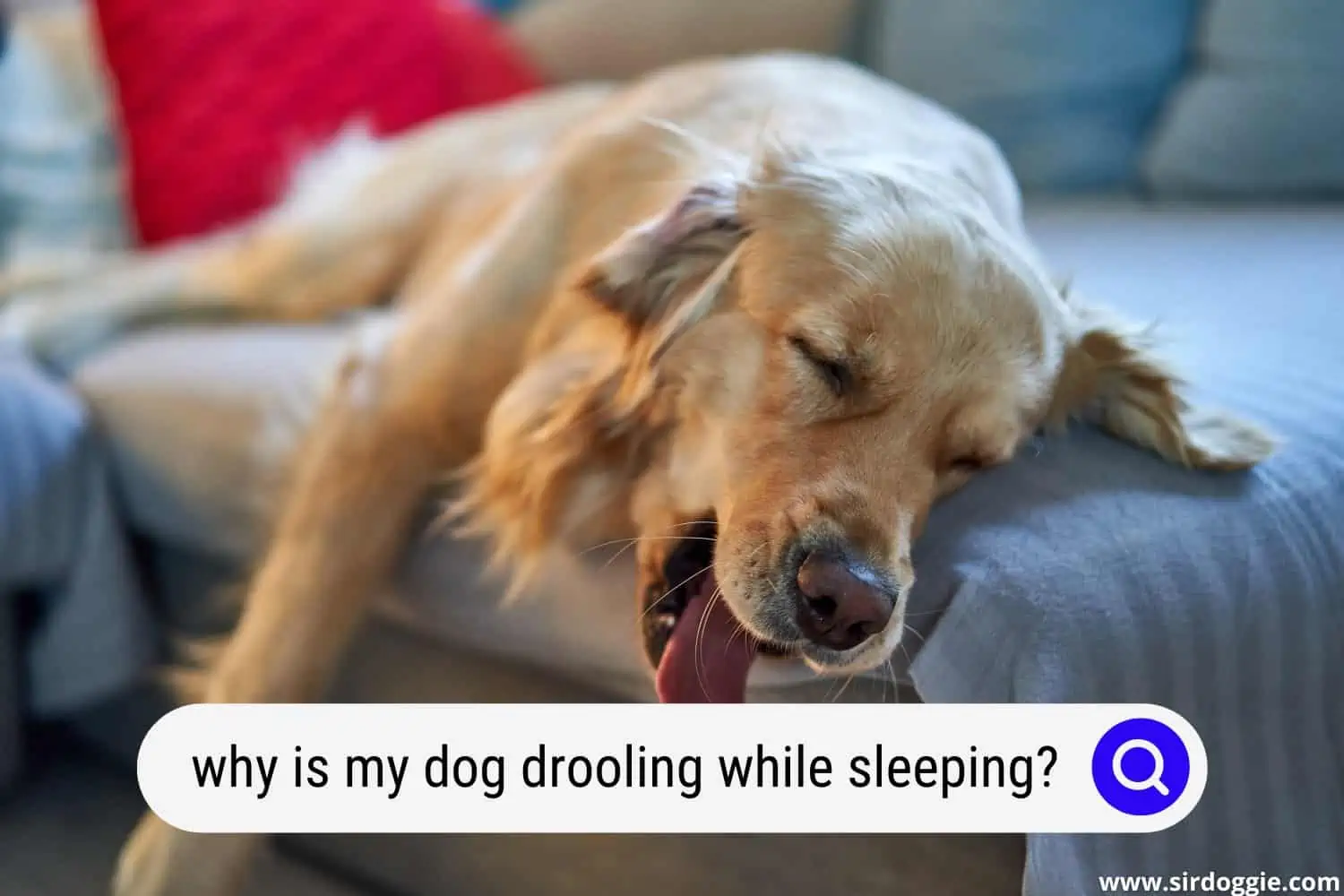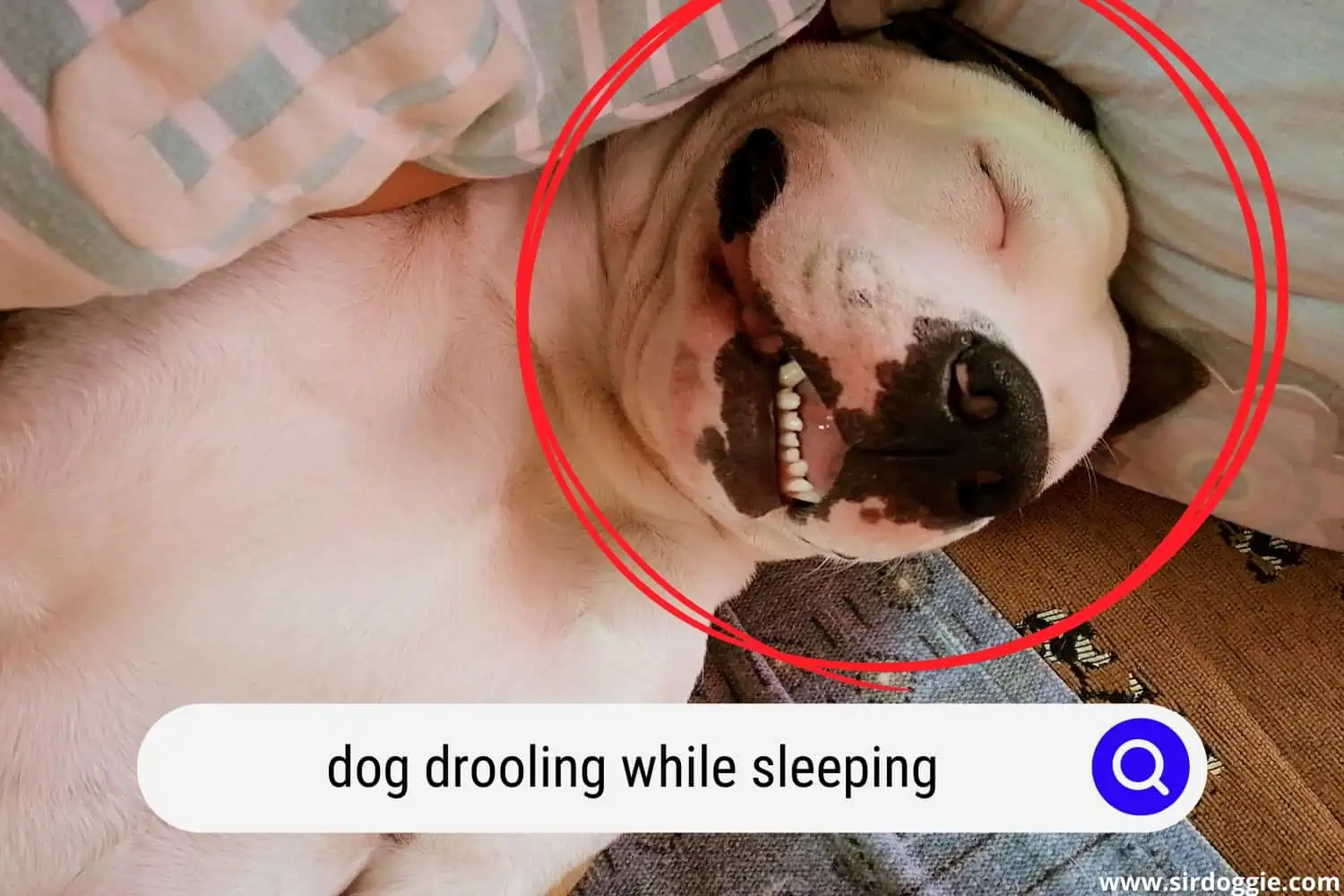Why is My Dog Drooling While Sleeping? (4 Reasons)
Not much is more frustrating for a dog owner than landing on a wet spot, like on a couch, or even a bed. There’s not much you can do at that point, except maybe shoo the pooch away from the area, try to pat it with a dry towel, and wait for the wetness to disappear.

Ever wonder, Why is my dog drooling while sleeping? There are a lot of normal reasons a dog might drool during sleep, including heat, dreams, or even simple gravity. However, there are also a few potential causes that may warrant a look by a veterinarian.
Still, understand that most of the time, sleep-drooling by a dog does not mean trouble. Too much saliva followed by drooling is known as hyper-salivation. Sometimes it’s quite normal, other times it could be an indicator of health troubles.
Let’s list some possible reasons below, along with potential remedies.
Dogs, Saliva, and Drooling
The bodies of dogs, just like humans, produce a thick liquid called saliva inside the mouth to help in the digestive process. Saliva is almost entirely water, yet it does contain electrolytes, antibacterial elements, and enzymes, all of which help the mouth and throat area and aid the digestion of food.
The key enzyme is called amylase, which initiates the digestion process by breaking down food matter, while the saliva moistens and softens food bits.
Sometimes, more saliva is produced than the dog can manage to swallow, for any number of reasons. Each of the following is rather normal and should not be cause for alarm:
1. Relaxation
C’mon now, how many of us reading this have awoken to a wet pillow after drooling heavily through a deep sleep? What makes us drool while asleep is the same that makes a dog do the same: jaw and mouth muscles, and the throat area, relax as a sleep pattern deepens, which in turn reduces control compared with when we are awake.
2. Gravity
Sometimes a dog drools while sleeping due to a simple gravitational pull. It’s a matter of where excess saliva collects inside the mouth, where it can more easily drip out. Also, it might flow to an area of limp muscles, furthering the problem. When saliva pools near the mouth, instead of in the rear to induce a natural gag reflex to swallow, drooling happens. The exact position of the canine’s head while asleep can contribute, too.
3. Heat
If a young dog suddenly starts drooling while asleep, maybe consider the seasons and your environment. Did more sunshine (and therefore heat) penetrate your living area? Furry mammals like dogs pant (breathe a lot with an open mouth) to help their bodies expel heat (because they cannot sweat heavily like humans). This might not be an hourly thing, but something that developed over a day that was hotter than usual. The dog’s body might have produced a lot of saliva to stay cool, then at night while asleep it just drips out.
If your dog’s bed drooling begins around the time he or she starts laying in different places, like on concrete in the shade outside, or on a cool tile floor instead of atop upholstered furniture, the drooling might just be a sign that the dog is very hot.
4. Dreams
Maybe the sleep drool is just the symptom of some serious dreams — like your pooch eyeing a steak, or chasing a squirrel. Once again, they’re much like us, and their bodies can react to things their brain might perceive as real.
When a Dog’s Drooling During Sleep is More Serious
The problem could be a fractured tooth, or tumors inside the mouth, esophagus, and/or throat. Tartar buildup and irritation of the gums can also lead to drooling, as can an infection in the mouth. Or, a foreign item like a splinter wedged between teeth and gums can lead to unconscious slobbering. (This final note is quite common for drooling with dogs).
Here are some conditions that can make it difficult for a dog to swallow saliva normally, or could result in the production of excess saliva.
Injuries
Remember that dogs can bite off or chew any number of items, including wood, or toys. Those items could have sharp edges and during the chewing process cause cuts inside the mouth, which in turn generates more saliva production by the body in response.
Stomach Discomfort
It’s not like your dog can tell you it has a tummy ache. As it suffers through the discomfort, if asleep, the canine’s body might be reacting. Much of the time it’s because he or she ate something they should not have, like a small toy, or stuffing from a furniture piece. The resultant stomach distress can cause drooling.
(It’s important to note here that toxic substances, like poisonous plants in your yard, cleaning chemicals, or pesticides could be the cause. If it comes with other symptoms like shaking, vomiting, or lethargy, contact your veterinarian right away.)
Mouth or Throat Troubles
Ever had a throat so sore you purposely avoided swallowing at all costs? The same could be true for your pooch. Anything that might bother the mouth and throat area, like a virus, or a fractured or infected tooth, or even tumors inside the mouth or esophagus, can create more drool.
To address excessive drooling especially if it just started during sleep, revisit your dog’s dental routine. Are you brushing the dog’s teeth often, and having the vet oversee dental health? Take time to look inside your dog’s mouth, for signs of trouble like brown or yellow plaque deposits, inflamed gums, or sight of a sliver of wood or bone between teeth.
Many other possible conditions are causing the drooling during sleep. The key is to pay attention to the dog’s behavior when the excessive drooling begins, and if it persists. Log the changed actions so you can report it to the vet when you visit.
Words on Breeds and Drooling
Certain breeds are known to drool more than others no matter the environment or circumstances. It’s physiological: the structure of their jaw and nose are shaped in such a way that the dogs cannot handle the saliva flow.
Very big breeds can have saggy lips and/or drooping jowls, which are not designed well to hold the moisture back. Bloodhounds, St. Bernards, Newfoundlands, and Mastiffs are some of the excessive drooling breeds.
Treatment for Dog Drooling at Sleep
Addressing the sleep drooling could be done at home, or with assistance from a vet. Generally, treatments are broken into 2 categories:
Physical
Since there are so many possible causes for sleep-time drooling, what your vet prescribes can vary greatly. Treatment could be anything from teeth cleaning or dental care to removing foreign objects from the teeth or gums, prescribing medication for a stomach or digestive issue, or otherwise doing something to heal oral injuries.
Behavioral
Unlike excessive drooling when a dog is awake — when you can reward or punish actions and therefore adjust how the pooch acts — sleep-time drooling is more challenging. You might try waking the pet up when you catch the drooling in action, but how effective would that be? It’s probably better to monitor the dog’s actions and behavior over several days, to ensure the problem goes away. If it does not, watch for the trouble spots mentioned above.

Summary
Dogs drooling while sleeping is probably more common than you might imagine. If your pooches do not drool while slumbering, consider yourself lucky, because if it becomes a consistent pattern, any dog’s owner could be alarmed.
It’s important to note that if mouth pain or another problem is causing excessive drooling, it probably happens both when the dog is asleep as well as awake. If you notice excessive drooling, immediately start to pay more attention to your dog and his or her behaviors and routines.
Most of the time there is a natural cause for the new pattern of drooling. A common one is the arrival of warmer (or even hot) weather. Your pooch may drool more as its body tries to stay cool. Such situations do not usually last that long, and in most instances are not cause for concern.
However, when the sleep-time drooling is accompanied by other symptoms — like shaking, lethargy, or even seizures — something could be off. A trip to the vet’s office is probably a wise move.
Related Reading: Do Shar-Peis Drool? Read This First!

Family Dog Expert Author
Hi there! I’m Stuart, a devoted dog lover and family dog expert with over a decade of experience working with our furry companions. My passion for dogs drives me to share my knowledge and expertise, helping families build strong, loving bonds with their four-legged friends. When I’m not writing for SirDoggie, you’ll find me hiking, playing with my beautiful dog, or studying music.